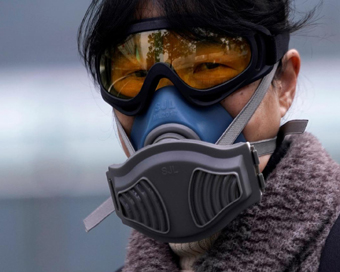Gallery
 PM Modi visit USA
PM Modi visit USA Only the mirror in my washroom and phone gallery see the crazy me : Sara Khan
Only the mirror in my washroom and phone gallery see the crazy me : Sara Khan Karnataka rain fury: Photos of flooded streets, uprooted trees
Karnataka rain fury: Photos of flooded streets, uprooted trees Cannes 2022: Deepika Padukone stuns at the French Riviera in Sabyasachi outfit
Cannes 2022: Deepika Padukone stuns at the French Riviera in Sabyasachi outfit Ranbir Kapoor And Alia Bhatt's Wedding Pics - Sealed With A Kiss
Ranbir Kapoor And Alia Bhatt's Wedding Pics - Sealed With A Kiss Oscars 2022: Every Academy Award Winner
Oscars 2022: Every Academy Award Winner Shane Warne (1969-2022): Australian cricket legend's life in pictures
Shane Warne (1969-2022): Australian cricket legend's life in pictures Photos: What Russia's invasion of Ukraine looks like on the ground
Photos: What Russia's invasion of Ukraine looks like on the ground Lata Mangeshkar (1929-2022): A pictorial tribute to the 'Nightingale of India'
Lata Mangeshkar (1929-2022): A pictorial tribute to the 'Nightingale of India' PM Modi unveils 216-feet tall Statue of Equality in Hyderabad (PHOTOS)
PM Modi unveils 216-feet tall Statue of Equality in Hyderabad (PHOTOS)The Badminton Association of India (BAI) has announced a 14-member-strong India squad for
- Men’s Sr Hockey Nationals to be played in division-based format from April 4
- Mensik denies Djokovic 100th title in Miami final
- KIPG: Son of a vegetable vendor, Bihar’s Jhandu Kumar eyes Worlds, 2028 Paralympics
- Hardik Singh credits hard work and team unity for receiving HI Midfielder of the Year award
- Djokovic, Alcaraz land in same half of Miami draw
Coronavirus: Fake news makes disease outbreaks worse Last Updated : 14 Feb 2020 01:42:59 PM IST 
Covid-19 (file photo) The novel coronavirus (COVID-19) has claimed over 1,300 lives in China and the rise of fake news could be making disease outbreaks worse, say researchers, adding that efforts to stop people sharing false news, misinformation and harmful advice on social media could save lives.
Researchers from UK's University of East Anglia (UEA) focused on influenza, monkeypox and norovirus across two studies, but they said their findings could also be useful for dealing with the COVID-19 outbreak.For the study, published in the journal Revue-Depidemiologie-Et-De-Sante-Publique, the researchers' team set out to test the effect of sharing dangerously wrong information on human health during a disease outbreak."Worryingly, research has shown that nearly 40 per cent of the British public believe at least one conspiracy theory, and even more in the US and other countries," said COVID-19 expert and study's researcher Paul Hunter, Professor at UEA.According to the researchers, when it comes to COVID-19, there has been a lot of speculation, misinformation and fake news circulating on the internet - about how the virus originated, what causes it and how it is spread.Misinformation means that bad advice can circulate very quickly - and it can change human behaviour to take greater risks.For the results, the researchers created theoretical simulations which took into account studies of real behaviour, how different diseases are spread, incubation periods and recovery times, and the speed and frequency of social media posting and real-life information sharing.They also took into account how a distrust in conventional authorities is closely linked to the tendency to believe in conspiracy theories, the phenomena that people interact within 'information bubbles' online, and the fact that people are more likely to share false stories than correct information online.The researchers also investigated strategies to fight fake news - such as drowning bad information with good information and "immunising" people against bad information though better education."We found that misinformation during epidemics of infectious disease could make those outbreaks more severe," said the study's researher Julii Brainard."We tested strategies to reduce misinformation. In our first study, focusing on the flu, monkeypox and norovirus, we found that reducing the amount of harmful advice being circulated by just 10 per cent - from 50 percent to 40 per cent - mitigated the influence of bad advice on the outcomes of a disease outbreak," Brainard added."Our second study, which focused on norovirus, showed that even if 90 per cent of the advice is good, some disease will still circulate," Brainard said.In the second study, the researchers were also interested in the 'herd immunity' levels required to "immunise" people against fake news.According to the study, the modelling suggests that any 'immunity' against bad advice reduces outbreak impacts.IANS London For Latest Updates Please-
Join us on
Follow us on








172.31.16.186







